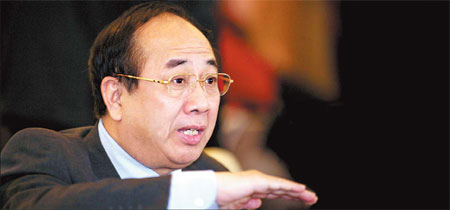The Western view of Tibet is colored largely because of cross-cultural misunderstandings, which the media must bridge, a top official has said.
 |
|
Zhao Qizheng, head of the foreign affairs committee of the country's top political advisory body, speaks on the sidelines of the ongoing annual CPPCC session, March 11, 2009. |
Zhao Qizheng, head of the foreign affairs committee of the country's top political advisory body, said: "The few foreigners who have visited Tibet hold three impressions of the region - one, it is beautiful; two, it is occupied by China; and three, Han Chinese culture has assimilated Tibetan culture.
"Other than the first impression, the remaining two are false notions."
Zhao, the spokesman for the National Committee of the Chinese People's Political Consultative Conference (CPPCC) and the dean of the journalism school at Renmin University of China, said the country's media plays "an important role in presenting the true picture of Tibet", as the region marks the 50th anniversary of the abolishment of slavery and a theocratic regime on March 28.
"We have made great progress in Tibet ... now we need to present the truth of that progress," Zhao told China Daily on the sidelines of the ongoing annual CPPCC session.
When asked about the criticism from the West regarding Chinese media coverage of Tibet, Zhao stressed the need for objectivity.
"Reporting reality is the best way to be objective. If a reporter goes to Tibet and notices only the negative aspects and not the progress we've achieved there, is that objectivity?
"Likewise, if a foreign news cameraman comes to Beijing and shoots seven minutes of areas with domestic waste and three minutes of beautified locations, would it mean Beijing is a city full of garbage?"
Similarly, Zhao said central authorities had achieved a lot in Tibet over the past few decades but a few stains that remain could paint a wrong picture.
The activities of the Dalai Lama abroad are also "responsible for the discrepancies in foreign reports that present an inaccurate picture of the situation in Tibet" and show China in a bad light, Zhao said.
Last year, Western media reports on the March 14 riots in Tibet and the protests against the Beijing Olympic torch relay led to strong reactions from people at home and abroad, who said the coverage was "negative and biased".
Zhao also said the media had a crucial role to play in the development of Sino-US ties.
"Most people on both sides have never been to each other's countries and they depend on the media for information. It is the duty and responsibility of members of the press to report accurately," he said.
(China Daily March 12, 2009)